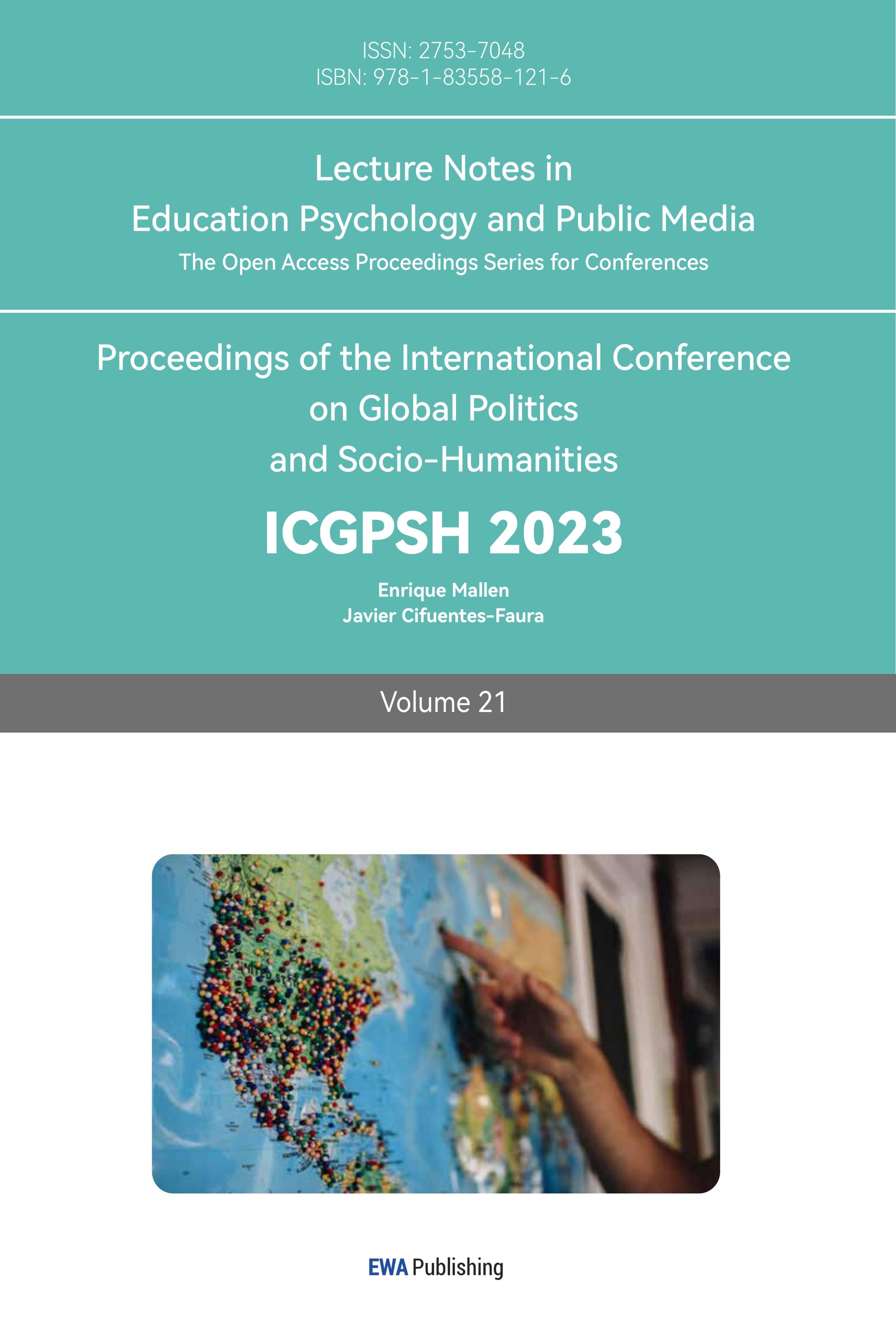References
[1]. John, J. (2022). The Causes and Consequences of the Ukraine War. Russia Matters. https://www.russiamatters.org/analysis/causes-and-consequences-ukraine-war
[2]. Briggs, W. (2022). The US role in the Russia-Ukraine conflict. Green. Left. https://www.greenleft.org.au/content/us-role-russia-ukraine-conflict
[3]. Madhani, A. (2023). Biden’s test: Sustaining unity as Ukraine war enters. Year 2. ABC News Internet Ventures. https://abcnews.go.com/Politics/wireStory/bidens-test-sustaining-unity-ukraine-war-enters-year-97318652
[4]. Shifrinson, J. (2022). What Is America’s Interest in the Ukraine War? Russia Matters. https://www.russiamatters.org/analysis/what-americas-interest-ukraine-war
[5]. Mueller, J. (1991). Changing Attitudes Towards War: The Impact of the First World War. British Journal of Political Science, Vol. 21, No. 1, pp. 1-28. https://politicalscience.osu.edu/faculty/jmueller/bjps11991.pdf
[6]. Fishback, P. V. (2007). The World Wars. Government and the American Economy. The University of Chicago Press, Chicago. https://cloudflare-ipfs.com/ipfs/bafykbzacebppn6uqtlnxxgx3pejieueotblsrw6orlbfyuoiscdt34kvazeqw?filename=Price%20V.%20Fishback%20-%20Government%20and%20the%20American%20Economy_%20A%20New%20History-University%20Of%20Chicago%20Press%20%282007%29.pdf
[7]. Chinni, D. (2022). How Russia’s invasion of Ukraine will affect the American economy. NBC news. https://www.nbcnews.com/politics/meet-the-press/3-ways-russia-s-invasion-hurting-u-s-voters-ahead-n1290101
[8]. Abrams, E. (2023). Implications of the Russia-Ukraine War. Council on Foreign Relations. https://www-cfr-org.translate.goog/blog/implications-russia-ukraine-war?_x_tr_sl=en&_x_tr_tl=zh-CN&_x_tr_hl=zh-CN&_x_tr_pto=sc
[9]. The New York Times. (2022). What Does Russia’s Invasion of Ukraine Mean for the U.S. Economy? https://www.nytimes.com/2022/02/23/business/economy/russia-ukraine-global-us-economy.html
[10]. Charap, S & Priebe, M. (2023). Avoiding a Long War, U.S. Policy and the Trajectory of the Russia-Ukraine Conflict. Rand. org. https://www.rand.org/pubs/perspectives/PEA2510-1.html#U.S.%20Policy%20Options%20to%20Address%20The%20Impediments%20to%20Talks
[11]. White House, Gov. (2022). National Security Strategy. https://www.whitehouse.gov/wp-content/uploads/2022/10/Biden-Harris-Administrations-National-Security-Strategy-10.2022.pdf?ref=kyivindependent.com
[12]. Pew Research Center. (2022). Public Expresses Mixed Views of U.S. Response to Russia’s Invasion of Ukraine. https://www.pewresearch.org/politics/2022/03/15/public-expresses-mixed-views-of-u-s-response-to-russias-invasion-of-ukraine/
Cite this article
Zhang,Y. (2023). Research on the Impact of the Russia-Ukraine War on the United States. Lecture Notes in Education Psychology and Public Media,21,1-5.
Data availability
The datasets used and/or analyzed during the current study will be available from the authors upon reasonable request.
Disclaimer/Publisher's Note
The statements, opinions and data contained in all publications are solely those of the individual author(s) and contributor(s) and not of EWA Publishing and/or the editor(s). EWA Publishing and/or the editor(s) disclaim responsibility for any injury to people or property resulting from any ideas, methods, instructions or products referred to in the content.
About volume
Volume title: Proceedings of the International Conference on Global Politics and Socio-Humanities
© 2024 by the author(s). Licensee EWA Publishing, Oxford, UK. This article is an open access article distributed under the terms and
conditions of the Creative Commons Attribution (CC BY) license. Authors who
publish this series agree to the following terms:
1. Authors retain copyright and grant the series right of first publication with the work simultaneously licensed under a Creative Commons
Attribution License that allows others to share the work with an acknowledgment of the work's authorship and initial publication in this
series.
2. Authors are able to enter into separate, additional contractual arrangements for the non-exclusive distribution of the series's published
version of the work (e.g., post it to an institutional repository or publish it in a book), with an acknowledgment of its initial
publication in this series.
3. Authors are permitted and encouraged to post their work online (e.g., in institutional repositories or on their website) prior to and
during the submission process, as it can lead to productive exchanges, as well as earlier and greater citation of published work (See
Open access policy for details).
References
[1]. John, J. (2022). The Causes and Consequences of the Ukraine War. Russia Matters. https://www.russiamatters.org/analysis/causes-and-consequences-ukraine-war
[2]. Briggs, W. (2022). The US role in the Russia-Ukraine conflict. Green. Left. https://www.greenleft.org.au/content/us-role-russia-ukraine-conflict
[3]. Madhani, A. (2023). Biden’s test: Sustaining unity as Ukraine war enters. Year 2. ABC News Internet Ventures. https://abcnews.go.com/Politics/wireStory/bidens-test-sustaining-unity-ukraine-war-enters-year-97318652
[4]. Shifrinson, J. (2022). What Is America’s Interest in the Ukraine War? Russia Matters. https://www.russiamatters.org/analysis/what-americas-interest-ukraine-war
[5]. Mueller, J. (1991). Changing Attitudes Towards War: The Impact of the First World War. British Journal of Political Science, Vol. 21, No. 1, pp. 1-28. https://politicalscience.osu.edu/faculty/jmueller/bjps11991.pdf
[6]. Fishback, P. V. (2007). The World Wars. Government and the American Economy. The University of Chicago Press, Chicago. https://cloudflare-ipfs.com/ipfs/bafykbzacebppn6uqtlnxxgx3pejieueotblsrw6orlbfyuoiscdt34kvazeqw?filename=Price%20V.%20Fishback%20-%20Government%20and%20the%20American%20Economy_%20A%20New%20History-University%20Of%20Chicago%20Press%20%282007%29.pdf
[7]. Chinni, D. (2022). How Russia’s invasion of Ukraine will affect the American economy. NBC news. https://www.nbcnews.com/politics/meet-the-press/3-ways-russia-s-invasion-hurting-u-s-voters-ahead-n1290101
[8]. Abrams, E. (2023). Implications of the Russia-Ukraine War. Council on Foreign Relations. https://www-cfr-org.translate.goog/blog/implications-russia-ukraine-war?_x_tr_sl=en&_x_tr_tl=zh-CN&_x_tr_hl=zh-CN&_x_tr_pto=sc
[9]. The New York Times. (2022). What Does Russia’s Invasion of Ukraine Mean for the U.S. Economy? https://www.nytimes.com/2022/02/23/business/economy/russia-ukraine-global-us-economy.html
[10]. Charap, S & Priebe, M. (2023). Avoiding a Long War, U.S. Policy and the Trajectory of the Russia-Ukraine Conflict. Rand. org. https://www.rand.org/pubs/perspectives/PEA2510-1.html#U.S.%20Policy%20Options%20to%20Address%20The%20Impediments%20to%20Talks
[11]. White House, Gov. (2022). National Security Strategy. https://www.whitehouse.gov/wp-content/uploads/2022/10/Biden-Harris-Administrations-National-Security-Strategy-10.2022.pdf?ref=kyivindependent.com
[12]. Pew Research Center. (2022). Public Expresses Mixed Views of U.S. Response to Russia’s Invasion of Ukraine. https://www.pewresearch.org/politics/2022/03/15/public-expresses-mixed-views-of-u-s-response-to-russias-invasion-of-ukraine/









